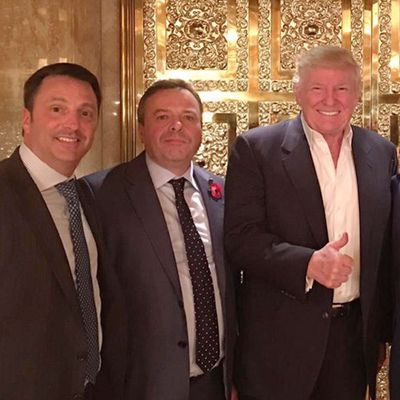
The most important thing to understand about the Russia scandal is that it perfectly fits a clear pattern of behavior. What Vladimir Putin is accused of doing to help Donald Trump win the presidency is essentially identical to what he is either accused of or proven to have done to help many other right-wing candidates in many other countries. As the plot in the United States is slowly exposed, a remarkably similar one in the United Kingdom is quickly surfacing.
Months before the United States narrowly elected Trump, the United Kingdom narrowly elected to withdraw from the European Union. Both votes advanced Russian foreign policy goals — in the latter case, by splitting up the Western alliance. (Trump has energetically pursued this strategy, too.) Russia employed many of the same tools to influence both elections. It deployed social-media bots and trolls to spread its message. It recruited friendly candidates who gave voice to previously marginal Russophile positions. And, as the newly surfaced evidence suggests, it indirectly financed the campaign.
British magnate Arron Banks supported the Brexit campaign with the largest political donation in British history. Leaked documents obtained by British reporter Carole Cadwalladr suggest Banks had more than mere philanthropic motives for this donation. Banks met several times with representatives of the Russian government, contradicting his previous claim to have met with Russians just one time.
More significantly, the documents suggest the Russians dangled a lucrative business deal. He would have the chance to buy in to a gold-mining consolidation, “potentially netting a profit of several billion dollars.” Banks denies that the gold deal ever happened, or that any of the meetings included any surreptitious collusion. “It’s a convenient political witch-hunt, both over Brexit and Trump,” he insists, using the same term favored by Trump.
To say that Bank’s defenses appear suspicious is a substantial understatement. If his meetings were innocent, why did he lie? If he never consummated the Russian gold-mining deal, why did he tweet at the time that he was investing in a big gold-mining deal?
The unfolding scandal in Britain contains many of the hallmarks of Russian covert influence elsewhere. The Russians are not manufacturing an issue out of whole cloth — nationalism clearly has an authentic popular basis — but instead use their influence to magnify it. They cloak their influence behind undisclosed meetings and hidden financial transfers. And when their partners’ lies about their contacts are exposed, they insist they lied for no apparent reason and have nothing else to hide.
The dangling of the gold-mine deal likewise reflects a classic Putin-era Russian strategy. The most lucrative sectors of Russia’s oligarch-driven economy involve monopolies over natural resources. They are the perfect bait for functional bribes. Russia can send businessmen, who may be operating with quiet support or control from the Kremlin, to offer deals that promise guaranteed profits. And those profits can be cover to inject Russian money into the West. If Banks was promised a lucrative gold-mining deal, as it appears, then he may have functioned as essentially a pass-through, enabling Russia to finance the Brexit referendum.
Trump has many surface ties to the Brexiteers. He has met with Banks and the nationalist leader Nigel Farage. He has echoed their rhetoric and even their cause, labeling himself “Mr. Brexit.” But more revealing is the pattern of similarities below the surface. The covert meetings, the endless false denials that they took place at all, the patina of legitimate business discussions, and the web of undisclosed financial ties. To believe that neither Trump nor Banks colluded directly with Russia in 2016 is to believe in an awful lot of strange coincidences.






























